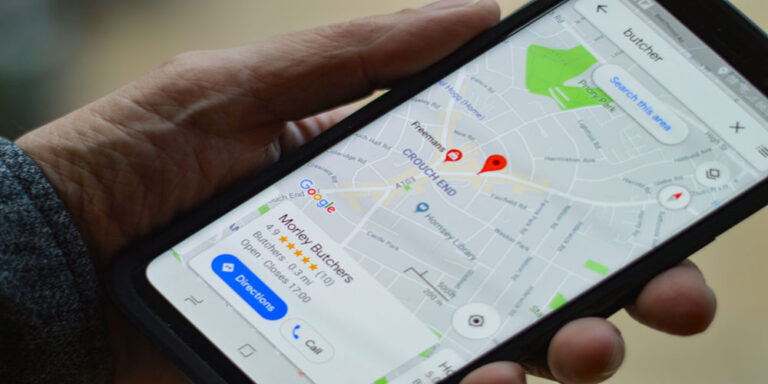
Target New Business with Local SEO
Definition of Local SEO and Its Importance for Small Businesses
Local SEO means improving a business’s online visibility to get more visitors from local searches. This is very important for small businesses that want to be seen in certain areas. By working on things like Google Business Profiles, creating content for specific locations, and getting links from local sites, businesses can help themselves show up in local search results. This can lead to more customers visiting their store and buying more.
How Local Search Differs from General Search
Local search queries usually have specific location words like city names, neighbourhoods, or phrases like “near me.” These queries are different from general searches. They focus on finding businesses or services close by. For instance, searching for “best coffee shop” is general. A search for “best coffee shop in Manchester” is local. Search engines, like Google, use different factors to rank local searches. They look at distance, importance, and visibility to give the best results based on where you are located.
Small businesses should focus on local SEO into 2025. Local SEO helps them reach nearby customers. When people search for services or products, they want to find options close to them. A good local SEO strategy will make sure these businesses show up in search results. This can lead to more customers and sales. Additionally, local SEO can help small businesses stand out among competitors. It is an effective way for them to grow and succeed in their area.
Small businesses can gain a lot by focusing on local SEO in 2025. This is important because more people are using mobile devices to look for local businesses, and voice search usually shows local results. Also, the competition for local searches is growing. This means it is crucial for small businesses to improve their local SEO strategies to stay in front. A good local SEO plan helps small businesses reach local customers better and build connections in the community.
Knowing how local SEO affects small businesses helps us prepare for the next steps. We will explore several strategies to use local SEO effectively for better business results.

1. Optimise Your Google Business Profile
Complete All Sections with Accurate Information
To make the most of your Google Business Profile (GBP), it is important to complete every section with correct and current information. This means adding your business name, address, phone number, website, and business category. A complete and accurate profile builds trust with Google and your customers, which helps your local search results. Make sure that the descriptions clearly show what your business is about. Use words that are important to your industry and location.
Regularly Update Business Hours, Photos, and Posts
Regularly updating your business hours, pictures, and posts is important for staying connected and having a strong presence. If your business hours change, update them quickly on your profile to help your customers. Good quality photos of your store, products, or services make a better impression. Also, posting often about promotions, events, and news keeps your audience interested and aware.
Set reminders to change holiday hours.
Use clear images for your business gallery.
Share posts about sales, new products or services, and community events.
Respond to Customer Reviews Promptly
Engaging with customer reviews shows you care about their feedback. This helps your reputation and encourages customers to stay loyal. Responding fast to all reviews, whether good or bad, shows you are good at customer service. It also shows you want to make your services better.
>>> Thank customers for their nice reviews.
>>> Address bad feedback in a helpful way.
>>> Share special reviews with careful replies.
By making sure your GBP is complete and correct, updating it often, and managing it well, you improve your local SEO. This helps customers find and choose your business more easily.
Next, we will look at why it is important to keep business information the same on all platforms.
2. Ensure NAP Consistency Across All Platforms
Keep the same business name, address, and phone number everywhere. A key part of good local SEO is keeping your NAP (name, address, phone number) the same on all online sites. It is important to have the same information everywhere. Changes can confuse search engines and customers. This confusion can lower your local search rankings. Your NAP should match on your website, Google Business Profile (GBP), social media pages, and online directories. Doing this helps make your brand look trustworthy and helps more people find you in local searches.
Regularly Audit Online Directories and Citations
To keep your business information consistent online, you should regularly check all the directories and listings where your business appears. This means looking at sites like Yelp, Yellow Pages, and other industry directories. By reviewing these regularly, you can find and fix any mistakes that have happened over time. This method helps keep your business details correct, which helps improve your local SEO.
Fix Inconsistencies in Business Information
When you find mistakes in your business information, it’s important to fix them quickly. Wrong or old NAP details can lower your local search rankings and confuse people. A good way to update all listings is to make a checklist or use a tool to manage citations. By making sure your business information is correct and the same everywhere, you make your brand more trustworthy and improve your local search results.
By keeping NAP the same, small businesses build a strong base for good local SEO. This important step helps in all other tries to improve local search rankings.
3. Create Location-Specific Website Content
Develop Dedicated Pages for Each Service Area
To make the most of local SEO, you need to create special web pages for each area where your business operates. These pages should explain the services you offer in different locations and include specific location details. If your business serves several cities, make different pages for each city. This will show the services you provide there. This method helps search engines understand your content better and can improve how well you show up in local search results.
Incorporate Local Keywords Naturally in Content
When creating content for pages that are specific to your location, it is important to include local keywords. Do good research to find the keywords that customers in your area are using to look for businesses similar to yours. Phrases like “plumber in Manchester” or “bakery in Birmingham” should fit smoothly into your text. Make sure these keywords show up in your titles, descriptions, and all through your text. This will make your writing easy to read and feel natural.
Create Location-Specific Blog Posts and Articles
Beyond regular pages, active content like blog posts and articles can help your local SEO efforts a lot. Create content that meets the special needs and interests of your local audience. This could include writing about local events, sharing customer success stories from your area, or talking about news that matters to your community. Updating your blog often with local content not only keeps your audience interested but also shows search engines that your website is active and important for local searches.
Creating a solid base with content specific to your location helps you gain important local backlinks. This can improve your business’s online visibility.
4. Build Local Backlinks
Partner with Local Businesses and Organisations
Joining forces with local businesses and groups is a strong way to create good backlinks. If you co-host events, work together on promotions, or make shared content, it can lead to backlinks from their websites to yours. This can improve your authority in local searches. Working together also helps you reach new customers and strengthens ties in the community. Both of these are important for local SEO.
Get involved in Local Events and be featured in Local News
Engaging in local events helps your brand get noticed. It can also improve your chances of getting links back from local media coverage. By sponsoring events, speaking at industry meetings, or sharing good ideas with the community, you can be featured in local magazines. This kind of coverage often includes links to your website. Search engines think these links are very important.
Get involved in local business groups and chambers of commerce
Joining local business groups and chambers of commerce can help you meet new people. It often gives you a chance to be listed on their websites. These listings usually have a link to your site, which can boost your local SEO. Also, taking part in these groups helps improve your business’s reputation in the local community. Building local backlinks is key to creating a strong local presence.
Next, we will focus on an important part of user experience—optimizing for mobile users.
5. Optimise for Mobile Users
Ensure Website is Mobile-Responsive
A mobile-friendly website is a must for small businesses using local SEO. Search engines are now focusing more on mobile-first indexing. A site built for mobile users improves the user experience and helps your search ranking. Make sure your website adjusts well to different device screens. This allows easy and consistent navigation, no matter what device the user has.
Improve Page Load Speed for Mobile Devices
Page load speed is very important for keeping users happy and improving SEO. Mobile users want fast pages, and search engines favor sites that deliver on this. Check how quickly your website loads with tools like Google PageSpeed Insights, and follow the suggestions given. Make your images smaller, use browser caching, and cut down on code to speed up load times and give a better experience for mobile users.
Make Contact Information Easily Accessible
Making contact information easy to reach helps local SEO work better. Make sure your business address, phone number, and email are clearly shown on your mobile site. Add click-to-call buttons, so users can contact you with just one tap. Simplifying how people can reach out helps them engage and can greatly raise local customer connections.
By optimising your website for mobile use, you create a strong local SEO strategy. This helps small businesses get and keep more local customers by improving mobile search and the user experience.
6. Gather and Manage Online Reviews
Implement a Strategy to Encourage Customer Reviews
Encouraging customer reviews is very important for improving your local SEO and building a good online reputation. Start by making it simple for customers to give feedback. Provide direct links to review sites like Google Business, Yelp, or other specific review sites. You could also send follow-up emails to happy customers, asking them to share their thoughts. Make sure your staff knows how important reviews are and trains to ask for them nicely when they talk to customers.
Respond Professionally to Feedback
Timely replies to customer reviews show that you care about service. Always respond politely, no matter if the feedback is good or bad. For good reviews, say thank you and appreciate the customer’s support. Handle negative feedback calmly and try to offer solutions. This practice helps keep customers and builds trust with new clients who read these messages.
Showcase Reviews on Your Website
Displaying reviews on your website builds trust and helps customers make choices. You can set up a special page for testimonials or add reviews to service pages. This builds confidence and increases how much people engage with your site. Showing customer reviews acts as strong proof from users that can lead to more sales.
Building and handling online reviews needs steady work, but it is very important for local SEO. It helps to improve your online presence, builds trust, and can really affect the choices of customers.
Transitioning to new strategies, managing online reviews well connects with larger local content plans. These strategies can improve your local SEO efforts.
7. Implement Local Keywords
Research and Target Location-Specific Keywords
To use local keywords well, begin by doing detailed research about your area. Find keywords that your customers may use when looking for the services you provide nearby. You can use tools like Google Keyword Planner, Moz, and SEMrush to discover popular local search words. It is important to understand what local users want to find. This helps make sure your content brings in the right visitors.
Optimise meta titles and descriptions using local words
Next, add these location-specific keywords to your meta titles and descriptions. This will help your website show up better in local search results. Make sure your meta titles are clear and include local keywords, like “Best Pizza in Durham.” Meta descriptions should share simple facts and use local words to get users’ attention, like “Delicious, handcrafted pizza in the heart of Durham.”
Use Keywords Naturally in Website Content
Incorporate local keywords into your website content. Do not stuff these keywords, as this can hurt user experience and search rankings. Instead, use different forms of your keywords and their synonyms. Create good content that helps your audience while adding local terms. This will boost your search engine ranking and make sure your content connects with local users.
It’s important to look at how content can connect with local events and customer stories. This can help you improve your local engagement.
8. Create Local Content Strategy
Develop Content Around Local Events and News
Engaging with local events and news is a strong way to make your business more visible in the community. Create content that focuses on local events, festivals, and landmarks. You can write blog posts or articles about upcoming happenings or share insights on past events. This not only brings in more visitors but also makes your business look like a trusted local source.
Showcase Local Customer Success Stories
Sharing stories about customers’ success in the local area helps build trust. Focus on testimonials and case studies from local customers who have had good experiences with your services or products. This makes your brand feel more human and connects with new customers who understand these local stories.
Address Local Community Needs and Interests
Identify and meet the needs and interests of your local community with your content. You can do this with blog posts, videos, or social media updates that discuss local issues or answer common questions. By showing you understand and care about the concerns of the local community, you can build loyalty and a good reputation.
Next, we will look into using social media to improve your local presence.
9. Leverage Social Media for Local Presence
Maintain Active Local Social Media Profiles
To build a strong local presence, you need to keep your social media profiles active and up-to-date. Engage regularly on sites like Facebook, Instagram, and LinkedIn. Posting often about the value your business brings to the local area can help create community involvement and increase brand awareness. Also, tailor your content to match local cultures and interests. This way, your business will feel more relatable to your audience.
Engage with Local Community on Social Platforms
Interacting with your local community on social media is very important. Respond to comments and messages quickly. Join local groups and forums to join in on community conversations. Share and comment on local events, news, and posts from other businesses around you. By being active in these talks, you show your involvement. This also helps your business feel like a key part of the community.
Share Location-Specific Content and Updates
Create and share content that is about your area. Highlight local events and show partnerships with other local groups. Share good stories from your local customers. Posting updates about your business joining local events or charity work can make your brand feel closer to people and build better community ties. This way, you connect your business with local interests, which makes it more important to your audience.
Moving on to the next step, focusing on useful local business directories is key for keeping a steady local SEO plan.
10. Optimise Technical SEO Elements
Improving technical SEO is important for boosting your local presence and keeping your website running smoothly. Local SEO involves more than just content; it also includes how search engines read and display your information.
Implement Local Schema Markup
Schema markup, or structured data, assists search engines in understanding your business information. When you use local schema markup, you give search engines clear details about your business, like its name, address, phone number, and hours of operation. This can improve how often your business shows up in local search results and increase clicks on your website.
Optimise URL Structure for Local Searches
Your website’s URL structure should be clear and important for local searches. Use detailed URLs that have location keywords. For example, instead of using a simple URL like www.example.com/page1, use www.example.com/london-plumbing-services. This way, it helps users know what the page is about. It also helps search engines understand your site better for local searches.
Ensure Proper XML Sitemap Configuration
An XML sitemap is like a roadmap for search engines. It helps them find the most important pages on your website. Make sure your XML sitemap is set up correctly. It should have all your local pages and be updated often to show changes. Send your sitemap to search engines like Google. This can help improve how your site appears in searches. Keeping it updated will help search engines know which pages to look at. This way, your latest content will be noticed.
By adjusting these technical parts, you will make a better and easier website that shows up in local searches. Paying close attention to detail will improve your local SEO plan and help it grow over time. After focusing on technical SEO, we will move to another key part of local SEO.
11. Utilise Local Business Directories
List Business in Relevant Local Directories
Registering your business in local directories can really help your online visibility. First, find and list your business in trustworthy directories that match your industry in your area. Some well-known choices are Yelp, Yellow Pages, and other specific directories for your industry. Make sure your business name, address, and phone number (NAP) are right so there is no confusion and to improve your local search rankings.
Maintain Consistent Information Across Directories
Being consistent is important for local SEO. Your business information must be the same everywhere. This lets people trust your business more and helps search engines find your information easily. If your name, address, and phone number are not the same in different places, it can hurt your search ranking. So, check every detail before you send it in.
Regularly Update Directory Listings
It’s important to update your directory listings regularly. This helps keep them correct. If your business hours change or you have new services or special offers, make sure to update that information quickly. Regular updates help customers see the latest details about your business. This way, your listings will stay useful for them.
Keeping a strong presence on local business directories helps your local SEO. It also builds trust with new customers by giving them correct and up-to-date information. This step is key in creating and holding your business’s online authority.
12. Monitor and Analyze Local SEO Performance
Track Local Search Rankings and Visibility
To make sure your local SEO work is effective, it’s important to check your local search rankings and visibility. Use tools like Google Analytics and Google Search to see how your website is doing in local search results. Look closely at the keywords that drive traffic to your site and how your rankings change over time. Regularly review this information to find patterns and chances to get better.
Monitor Competitor Performance in Local Search
Knowing how your competitors do in local search can give you useful insights. It can help you improve your plan. Tools like Ahrefs and Moz can help you look at your competitors’ backlinks, keywords, and local SEO methods. Focus on what they do well and where they fall short. Think about how you can make your business stand out. Checking your performance against your competitors often can help guide your work and keep you ahead in your local area.
Adjust Strategy Based on Analytics Data
Local SEO needs you to keep changing based on data you gather. Use what you learn from tracking how well you’re doing and looking at what your competitors are doing to improve your plan. If you see a keyword bringing in a lot of traffic, think about making more content centered around it. Also, if a competitor is doing better than you in a certain area, check out their strategy and see how you can do better. By looking at and changing your plan often, you can stay up to date with trends and keep a strong local SEO presence.
Consistent monitoring and analysis not only help your local SEO efforts but also boost your business’s online presence. By staying informed and flexible, you can make decisions based on data that improve your visibility and reach in your local market.
Making Local SEO Effective for Your Business
Importance of Consistent Effort in Local SEO
Local SEO is not just something you do once; it is an ongoing task that needs regular care. To stay ahead, small businesses should keep their Google Business Profile (GBP), social media, and local business listings up to date with correct and fresh information. Checking online reviews often and replying to customer comments helps earn trust and build credibility. Keeping up with this work is very important for being visible in local searches and standing out from other businesses that are also focusing on local SEO.
Balancing Different Local SEO Strategies
A good local SEO strategy uses a mix of tactics. It is not enough to do well in just one area, like getting online reviews, while ignoring things like technical SEO or content creation. Small businesses should spread out their efforts. They can improve their website for mobile users, create local backlinks, and use specific location keywords. This overall approach helps with local search optimisation. It also increases the chances of showing up in local search results and bringing in more visitors.
Measuring Success and Adjusting Approaches
To check how well local SEO is working, regular analysis is key. Tools like Google Analytics and Google Search do a great job of showing website traffic, user behavior, and search rankings. By keeping an eye on these numbers, businesses can see what is effective and where they can do better. Tracking local search rankings and visibility is important. Also, knowing how other businesses are doing helps to stay competitive in the local market. By making changes based on data, businesses can keep improving their local search results.
If you feel that managing your stretegy can be time consuming and a little confusing, then using a local SEO agency for your project can help your business meet its marketing needs to help attract new business, and increase local profile. By focusing on these areas, small businesses can improve their local appearance, draw in more customers, and help their growth.





